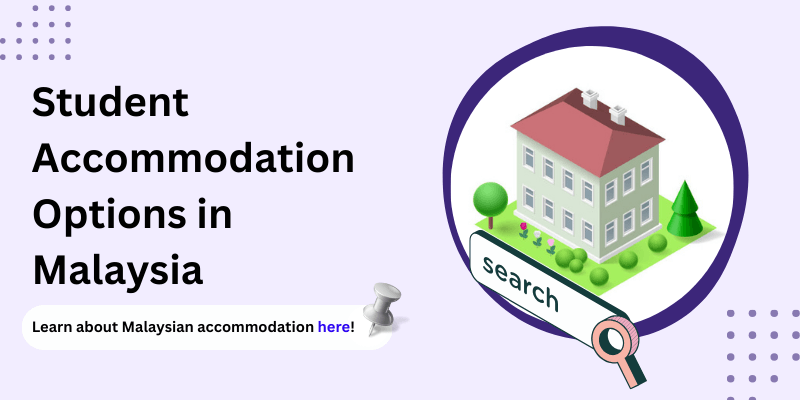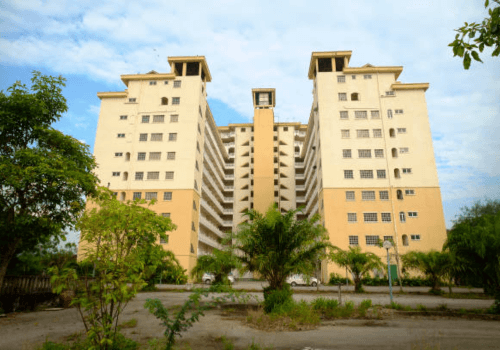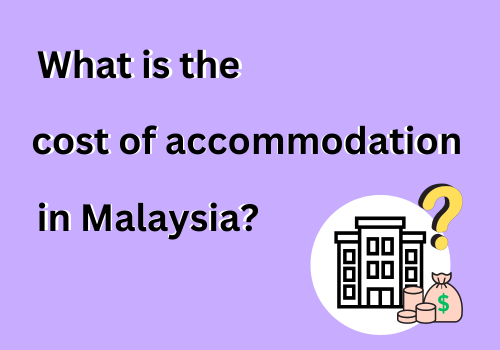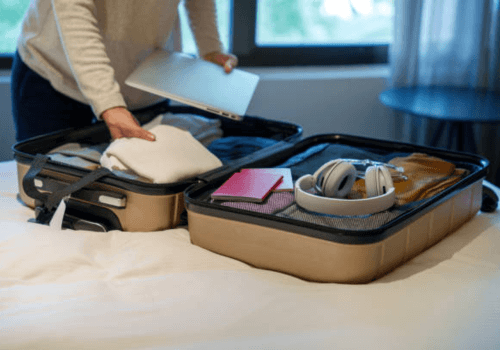Student Accommodation Options in Malaysia
May 29, 2024
Anis

Accommodation is a crucial factor influencing the success and well-being of students throughout their academic journey.
In Malaysia, a country in Southeast Asia known for offering quality education at an affordable price, students have many options for where to stay, both on and off campus.
Each option has its own advantages. On-campus housing includes dormitories, hostels, and apartments provided by the university. This means that students are being close to classes, university facilities, and a lively community.
On the other hand, off-campus options include sharing apartments, renting privately, or staying with a host family. These choices give students more independence and a chance to experience different living situations.
However, they also require considering factors like distance from the university, transportation, and safety.
Before choosing any accommodation, it's important to understand the costs involved and keep in mind some housing tips.
This article aims to give students a thorough overview of accommodation in Malaysia, helping them make informed decisions for a comfortable and rewarding academic experience.
What is on-campus and off-campus accommodation like in Malaysia?

As a university student in Malaysia, you can choose your own accommodation options to suit your preferences and needs.
Since Malaysia's universities provide both on-campus and off-campus housing options, let's take a look at the pros and cons for both choices:
a) On-campus accommodation
On-campus accommodation is advantageous for university students in Malaysia as it offers multiple benefits that enhance their academic journey.
One key advantage is the proximity to your classes, ensuring quick access to academic facilities and fostering an environment conducive to focused studying.
Living on campus extends beyond classrooms, placing you in close proximity to university amenities such as libraries, recreational facilities, and student support services.
This not only adds to the appeal of on-campus living but also facilitates a well-rounded learning experience within a vibrant community. The cost of on-campus housing varies based on the type of accommodation you choose.
Generally, university-managed options like dormitories offer more affordable rates as they are shared with fellow students.
These accommodations come equipped with essential facilities, including study areas, laundry services, recreational spaces, and round-the-clock security for a safe living environment.
To secure on-campus housing, you typically need to complete an application form provided by the university, usually during registration.
Alternatively, certain universities may offer an online application system within their university portals.
It is advisable to ensure a strong internet connection or submit the accommodation application early, as placements are often processed on a first-come, first-served basis.
b) Off campus accommodation
Deciding to live off-campus in Malaysia is a choice that gives you more freedom and a personalized living experience.
Many students go for this option because it allows flexibility and a diverse living arrangement, making your academic journey more culturally and socially enriching.
However, living off-campus has its challenges. For example, in shared apartments, you and your housemates need to communicate well and set clear boundaries for a comfortable living environment.
When you're thinking about off-campus living, consider a few things. How close you are to the university matters – it affects your commute time and convenience.
Living closer means easier access to academic facilities, but you might also want to weigh the benefits of a livelier community or lower costs in other areas.
Transportation is crucial, especially if you're living far from the university. Check if there's good public transportation or if you're close to essential services for a smooth daily commute.
Your safety is top priority, so research the security of the neighborhood, available facilities, and past incidents to make well-informed decisions about your well-being.
Some universities even have off-campus living suggestions to help you out. They can recommend good neighborhoods, give safety tips, and provide resources for finding a suitable place.
You can always check with your university's housing office or student services for useful insights and support throughout your exploration of off-campus living options.
What is the cost of accommodation in Malaysia?

a) On-campus housing cost
The cost of living in on-campus university accommodation in Malaysia varies depending on the university and the available housing options.
Typically, accommodations managed by the university, like dormitories and student hostels, offer more budget-friendly choices due to shared living arrangements.
Prices can range from RM 500 to RM 1,500 (USD 106 to USD 318) per month, influenced by factors such as the room type and facilities.
b) Off-campus housing cost
Renting housing off-campus in Malaysia involves various factors that significantly impact the overall costs.
These factors, including the location of the housing, utility bills, Wi-Fi charges, and maintenance fees, vary across regions and cities. They influence the affordability and budget considerations for university students.
- Location
In big cities like Kuala Lumpur, where there is high demand, the cost of renting an apartment can vary. In certain areas, apartment rates can range from RM 1,200 to RM 3,500 (USD 255 to USD 744) or even higher.
However, in smaller towns or suburban areas, you might find more affordable options with rates ranging from RM 500 to RM 1,000 (USD 106 to USD 212) . These rates are influenced by factors like how close the apartments are to universities, the amenities available, and room types.
- Utility bills
Utility bills are an important part of the overall costs when living off-campus in Malaysia. These bills include services like electricity, water, and gas.
Typically, these bills range from RM 150 to RM 300 (USD 31 to USD 63) per month, depending on factors like your consumption patterns and accommodation location.
For instance, the cost of electricity is influenced by how much you use electronic appliances, air conditioning, and lighting. Being mindful of energy-efficient practices, like turning off lights and appliances when not needed, can help keep these costs reasonable.
Water bills are usually based on how much water you use, considering factors like how often you use water and how many people live in your accommodation. Fixing leaks and adopting water-saving habits can help control these expenses.
Gas bills are related to cooking and heating, and they can vary depending on the types of appliances and heating systems you use.
- Wi-Fi
Wi-Fi is another aspect that adds to the overall cost of off-campus living. The charges for internet services typically vary, spanning from RM 80 to RM 150 (USD 17 to USD 32) per month.
These costs depend on factors like the internet service provider, the speed of the connection, and the data plan you choose.
Some rental places may already include Wi-Fi services as part of what they offer. Before you finalize your off-campus living arrangements, you should check if the rental place provides internet connectivity.
If it does, it can make budgeting easier and potentially save you from additional costs of subscribing to a separate internet plan.
But what if the rental place doesn't provide Wi-Fi? What can you do?
One option is to explore standalone Wi-Fi plans offered by different internet service providers.
You should research and compare different plans to find one that fits your budget and meets your connectivity needs. Look for plans that offer the speed and data limits you need for your academic and personal internet usage.
Alternatively, you can consider portable Wi-Fi devices or personal hotspots. These devices use mobile data networks to provide internet access.
They can be useful if you move around a lot or if the rental place has limited options for connectivity.
- Maintenance fee
Another aspect to consider when planning your budget for off-campus living in Malaysia is the possibility of maintenance fees being part of your rental agreement.
These fees are connected to shared facilities or common areas in the rental property.
Maintenance fees typically range from RM 50 to RM 100 (USD 11 to USD 21) per month, and they contribute to the upkeep of communal spaces.
These shared areas may include lobbies, elevators, gyms, swimming pools, or other amenities available to the residents.
The fees are intended to cover the costs of regular cleaning, repairs, and general maintenance to ensure that these facilities remain in good condition for the benefit of all tenants.
Before you finalize your rental agreement, it's important to carefully read and understand the terms regarding maintenance fees. Some rental places may include these fees in the overall rent, while others may require a separate payment.
How to secure an off-campus accommodation in Malaysia?
Based on the mentioned four factors above that affect the overall cost of renting off-campus housing, your next step is to understand the necessary procedures for securing your accommodation.
Typically, you will need to make a deposit, which is refundable upon the termination of the lease, as long as the property is well-maintained.
In Malaysia, there are three types of deposits commonly required:
Security deposit
This is usually one to two months' rent and is meant to cover damages or any outstanding rent. The amount can range from RM 1,000 to RM 3,000 (USD 212 to USD 638).
Utility Deposit
A small amount, around RM 100 to RM 200 (USD 21 to USD 42), is often needed as a utility deposit. This deposit is used to settle any unpaid utility bills at the end of your lease.
Booking Deposit
Some landlords may ask for a booking deposit to secure the accommodation. This upfront payment is usually equal to one month's rent and shows your commitment to renting the property. It is typically deducted from the security deposit when you move in.
When securing your accommodation, it's advisable to inquire with landlords or rental agencies about the specific deposits you'll be required to pay.
Another important step is to carefully review the rental agreements. These documents outline the terms and conditions of the lease, including details about rent payments, lease duration, and specific rules set by the landlord.
It's crucial to thoroughly read and understand these agreements before signing them to ensure a clear and mutually beneficial living arrangement.
Safety accommodation tips when you’re studying in Malaysia
Your safety should be your top priority when studying in Malaysia, whether you decide to live on-campus or look for off-campus housing. Here are some tips to help you maintain your safety:
1. Personal safety tips
Whether you live on campus or off campus, the security of your living space should be a priority.
Always remember to lock your doors and windows, especially when you're not at home or leaving your dormitory unattended. Taking this simple step can greatly improve the safety of where you live.
If you have roommates, you must communicate openly with them to establish safety measures that everyone can follow.
When everyone is committed to maintaining a secure living environment, it benefits everyone's well-being. By working together, you can address any security concerns that may come up.
You can also make a list of emergency contacts, including local authorities and the security office of your university.
Share this information with people you trust, like fellow students or neighbors, so that you have a support network in case of emergencies. Having a plan in place and people you can rely on can make a big difference in times of need.
2. Checking the credibility of landlords or rental agents
When looking for off-campus housing, it's important to prioritize your safety and build trust with your potential landlords or rental agents.
You can start by conducting thorough reference checks before making any final decisions.
You can reach out to previous tenants and gather information about their experiences to assess the trustworthiness of the landlords or rental agents.
Furthermore, make use of online platforms to explore reviews and testimonials about the prospective landlord or agency. This will give you a wider perspective and a better understanding of their reliability and reputation within the community.
3. Enhance your safety and security
Whether you choose on-campus or off-campus housing, it's crucial to recognize that property maintenance is a collective responsibility. Therefore, you play a vital role in ensuring a well-maintained living environment.
If you come across any problems or damages, make sure to report them quickly to your landlord or university hostel management.
This proactive approach contributes to the overall well-being of the living space and ensures that necessary repairs are addressed promptly.
4. Understanding local neighborhoods
Whether you're considering living on campus or off campus, it's important to spend time getting to know the area. This has a big impact on your satisfaction and safety.
If you choose on-campus living, start by talking to your dorm roommates or neighbors to build connections.
Establishing trust and familiarity with the people around you ensures you have a reliable support system in case anything unexpected happens.
For those looking into off-campus options, it's important to dig into details like crime rates and the security measures available in the surrounding neighborhoods.
Doing this research gives you valuable insights to make informed decisions about the safety and suitability of different housing choices.
Tips for a smooth move to your new accommodation
Making sure your move to your new living space, whether it's on-campus or off-campus, goes smoothly is really important to have a good start to your university experience.
Here are some tips to help you on move-in day:
1. Getting ready for move-in day

As you get closer to your move-in day, it's important to be well-prepared to make the transition to your new living space easier.
Start by making a detailed checklist of all the things you'll need for your studies and personal life. This includes things like stationeries, clothes, toiletries, and anything specific that your accommodation requires.
If you're moving into on-campus housing, make sure you know the university's rules and guidelines for move-in day. Find out the specific times you can move in, where to park, and any procedures you need to follow.
2. Important items to buy or bring
When it's time to pack for your educational journey, finding the right balance between academic necessities and personal comfort is important.
You can bring along items that hold sentimental value and bring familiarity and warmth to your space. These personal touches can make your new place feel like a home.
In addition to personal items, it's important to ensure you have all the necessary supplies for your studies. Pack essentials like notebooks and a reliable laptop to support your academic endeavors.
If you're moving into off-campus housing with a kitchen, you need to consider bringing or purchasing essential kitchen items such as utensils, pots, and basic groceries.
This will ensure that you're prepared for convenient and comfortable cooking in your new space.
Don't forget about creating a cozy sleeping area. Pack bedding, pillows, and sheets to transform your sleeping space into a comfortable haven.
It's also wise to have basic cleaning supplies on hand, especially if you'll be sharing living spaces with others. Keeping your environment clean and organized contributes to a positive living experience for everyone involved.
3. Getting used to your new surroundings and people
The first few days in a new place are really important for your educational journey. So, you can start by exploring the area around your accommodation.
Find out where important places like grocery stores, pharmacies, eateries, and public transportation stops are located. Getting familiar with these essential places early on will make your daily routine much easier.
If you're sharing your living space, you can communicate with your roommates or neighbors.
Building these relationships creates a supportive and friendly environment, and it helps you feel like you're part of a community. This makes it easier for you to adjust to your new home.
By taking these steps, you not only become more familiar with the practical aspects of the area.
But you also build a network of relationships that can be really helpful as you navigate the challenges and adjustments that come with your new academic environment.
4. Stay organized

Start your university journey by organizing your belongings in a systematic way. It's important to stay organized when moving into your new living space to ensure a smooth and efficient transition.
Sort your items into different groups, like school supplies, personal belongings, and household items. This will make it easier to unpack everything in an organized manner.
When packing, prioritize essential items that you'll need right away. This might include toiletries, a change of clothes, and important documents.
Making sure these important items are easily accessible will make your first few days in your new space more comfortable. It will also help reduce stress and make the adjustment process smoother.
5. Take a break when needed
Moving and settling into a new home can be challenging, both physically and emotionally.
During this time of change, it's important to prioritize your well-being. Here are some key things to consider for self-care during this transitional phase:
a) Rest and recharge
Moving involves many tasks that can be tiring, so it's important to include moments of rest.
Take short walks around your new neighborhood or dormitory area, practice calming breathing exercises, enjoy a good book, or listen to soothing music.
These breaks are vital for recharging and taking care of your overall well-being.
b) Take care of your mental health
Moving often brings up various emotions, like stress and worry. Take care of your mental health by being aware of these feelings and using healthy ways to cope with them.
Consider adding mindfulness or meditation to your daily routine to promote relaxation and emotional balance.
If you need extra support, don't hesitate to reach out to university counseling services or other available resources.
In conclusion, when it comes to selecting student housing in Malaysia, it's important to carefully weigh the pros and cons of on-campus and off-campus options.
Each option has its own benefits and difficulties. And, it's crucial to prioritize your safety by taking precautionary steps to ensure your well-being while studying in Malaysia.
Kickstart your education in Malaysia
We'll help you find and apply for your dream university
You might be interested in...
- Promoting Inclusivity at Malaysian Universities: Tips for Malaysian and International Students
- Taking IELTS test in Malaysia: Tips, Tricks, and Key Info
- How Asia Pacific University (APU) in Malaysia Prepares Students for the Future of Marketing Using AI
- Sunway University Tops Times Higher (THE) Rankings in Malaysia
- Discovering Academic Opportunities and Pathways at APU after SPM and IGCSE
- Asia Pacific University's (APU) Innovative Initiatives Prepare Students for Industry 4.0
- Sunway College emerges as Malaysia's best performing Cambridge GCE A-Level College in 2024
- Sunway University Wins Outstanding Support for Students Award
- Sunway University Partners with Universiti Kebangsaan Malaysia to Offer Medical Doctor Programme
- Sunway University Leads the Way as Host of THE Asia Universities Summit








